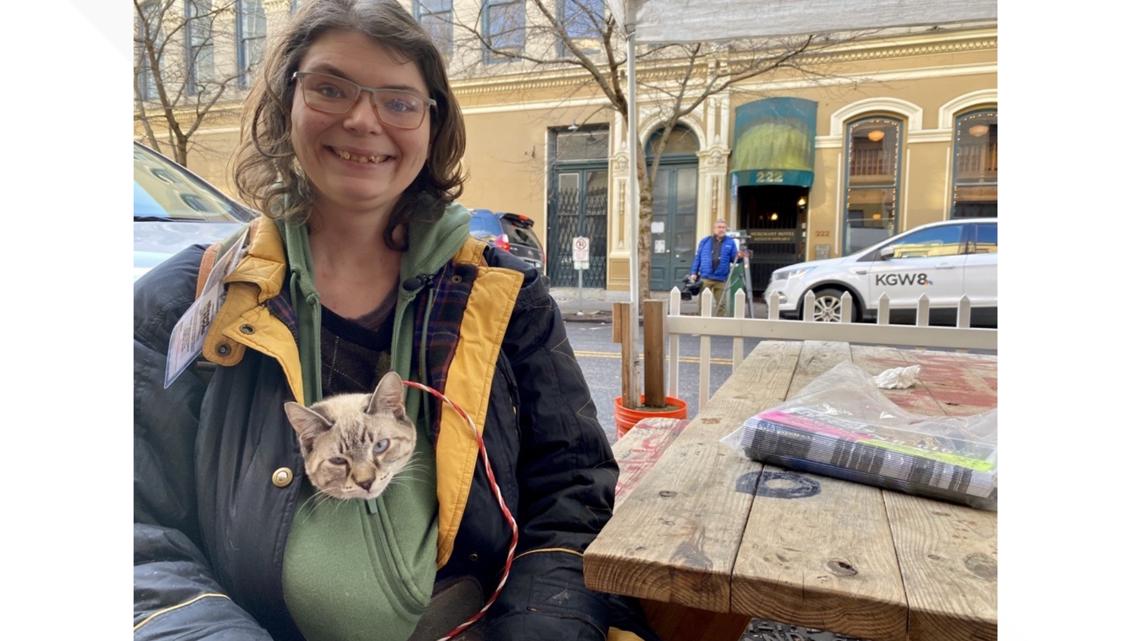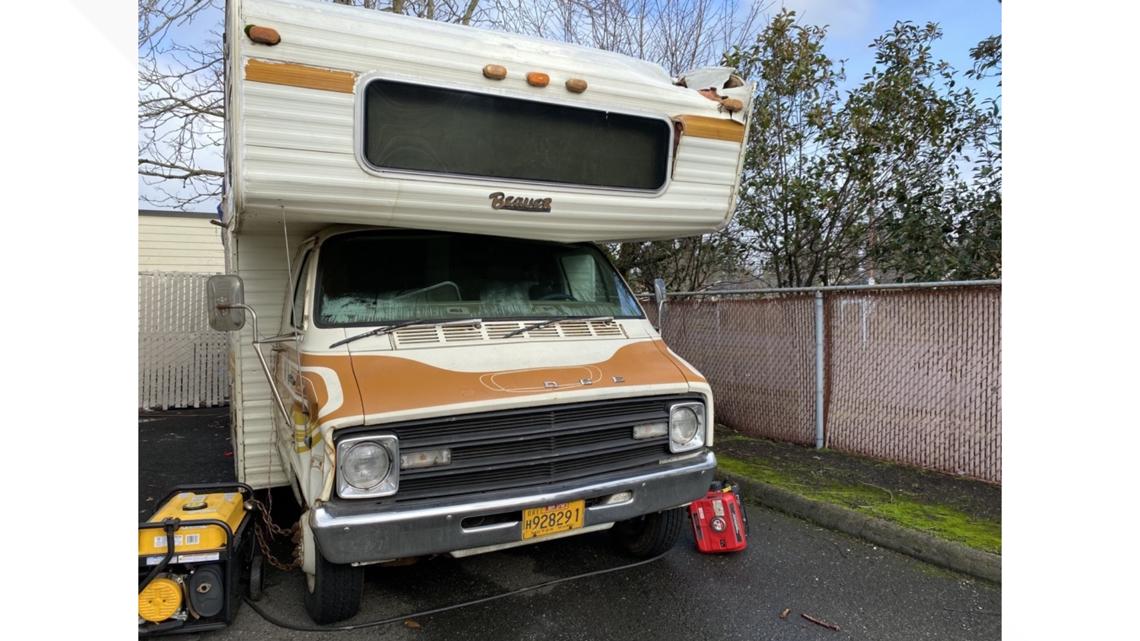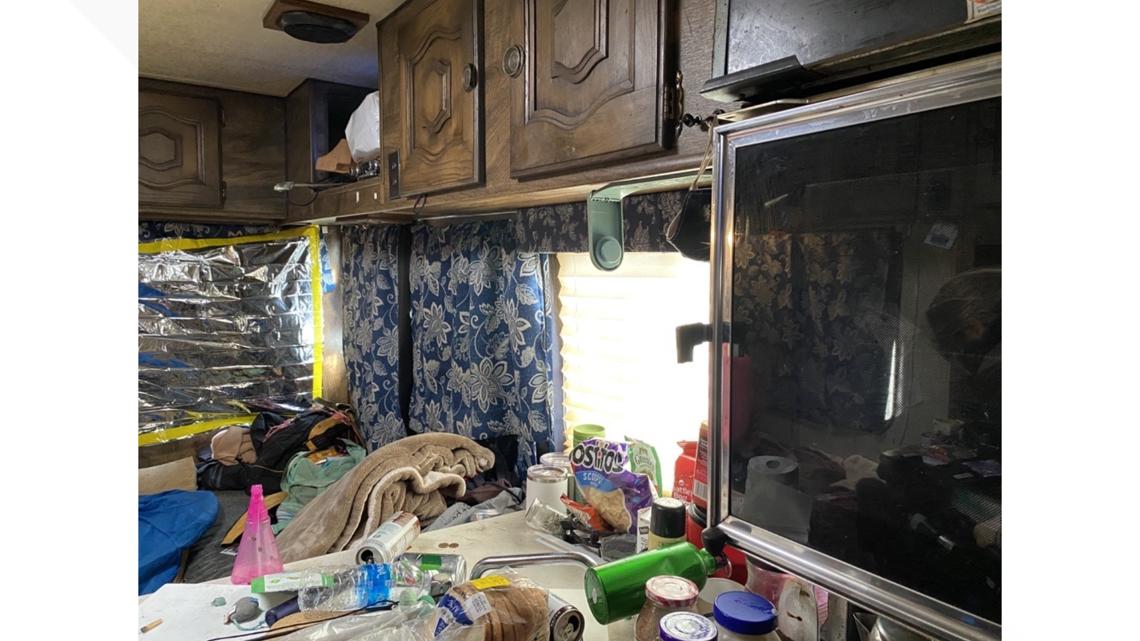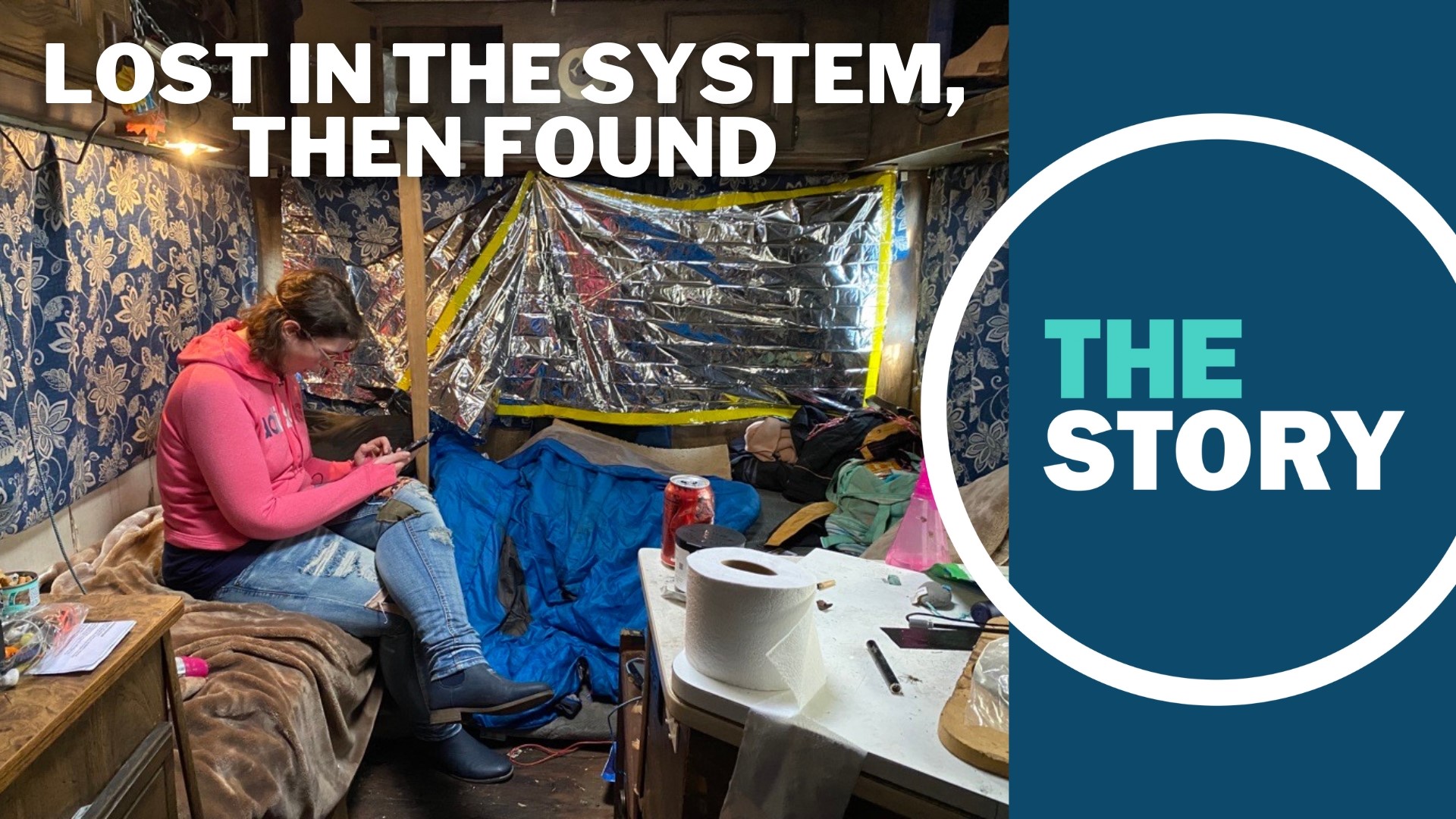PORTLAND, Ore. — On a rainy January morning in Portland’s Old Town neighborhood, it was hard to find anything resembling hope. But if one were to look closely enough, they’d see it. On this particular day, that glimpse of hope was sitting outside Street Roots, a nonprofit newspaper sold by homeless people like 26-year-old Velma Carter.
For years, Carter learned to get by with the basics after growing up homeless and in foster care. She spent much of her life on the streets. She said she was lost in the system and has had no luck finding a full-time job, let alone affordable housing.
However, it’s not for a lack of trying. When KGW’s Blair Best met her, Carter said she had just finished sending out her 43rd job application that month.
“It feels like there's no way for us to get off the street,” she said.
Most overnight shelters don’t work for Carter because she doesn’t travel alone. A small Himalayan Siamese cat stayed tucked inside her green zip-up sweatshirt throughout the interview.
“He's why I’m alive still,” she said of her furry companion, Ghost.


Carter agreed to give Best her phone number, and they stayed in touch. A few weeks later, they met in deep Southeast Portland behind a vacant corner store. It's where Carter hid her RV — one that’s seen better days. The roof leaked, the engine only ran on occasion and there was no working toilet. Despite all this, it was where Velma called home.
“I’m the rich homeless — you could say I’m part of the one percent of homeless that have stuff that ain't in a tent,” she said.
The RV also had a broken lock, which made it easy for unwanted visitors to gain entrance.
“That's honestly a fear of mine, coming home and having someone in here. I’ve had that already once,” she said. And it's not just people Carter fends off, but rodents too. “That's what I have a hatchet for, I’ve chopped a few of them … also, if I ever do get this stove up and running or ever do get a stove that works, I know how to make a rat stew.”


As the weather turned cold, Carter's days became dictated by the need to find heat.
“I wake up about 4 a.m. because that's usually about the time the generator shuts off,” she said. Every penny she makes goes toward turning it back on. “I want to have a stable house somewhere where I don't have to pay $20 dollars a day for 15 hours' worth of heat. It's an extreme struggle.”
Later that day, Best called Agape Village, a transitional shelter run by a church in Southeast Portland that had available openings. A few weeks later, they agreed to meet Carter. She filled out an application and waited for weeks for the results of her background check, which the village required, only to find out she didn’t pass due to an outstanding warrant in Clackamas County on a misdemeanor charge of resisting arrest.
“Oh, my lord don't get me started on that!” Carter exclaimed.
Nowhere to disappear to
Carter's desperate living went on into late spring, when she reached a breaking point.
“Because of my open court case right now, nowhere wants to take me ... lost in the system, I can't get off the street, I can't stay on the street, what do I do?" Carter said. "I’m not saying I’m going to, but I see why people turn to drugs.”
That day was particularly hard for Carter. She had just moved into a friend's new RV in the Northwest Industrial district. Things seemed to be looking up — the RV had heat and a stove that worked. Then, it burned down— one month later.
KGW was there the day after the fire, as Carter described what had happened and sifted through the debris.
The fire caused Velma and her friends to move back into her old RV. They found a new parking spot off Martin Luther King Jr. Boulevard.


At the same time, talks of stricter homeless policies were heating up inside Portland City Hall, culminating in the daytime ban on camping.
“I’m terrified of it, if they're going to be banning that how soon 'til they ban RVs?" Carter said. Best told her the bad news, that the ban did include RVs and other vehicles. "Oh boy, not what I've been reading ... oh boy."
Zaina, Carter's friend, opined that the city wants its homeless residents to disappear, but there's nowhere for them to disappear to.
Carter and her friends tried to relocate the deteriorating RV to Northeast 33rd Drive, a street lined with RVs and cars, home to a deeply-rooted homeless community. They didn't stay long before moving back to MLK Jr. Boulevard — adding to the growing camps there and the frustrations of neighboring business owners.
"We keep the doors locked, you saw. Every single day for years we've never unlocked the doors," a hair salon owner told Best. "I've called 311 a bunch of times just to have (the camps) cleaned up."
But Carter remained in that spot through the summer, until she told Best that she had some big news. She was pregnant and had the ultrasound photos to prove it.
"If it's a boy I'm going to name him Kody with a 'K,' and if it's a girl, Angelica," Carter said. "I'm three months pregnant as of the third."
At that point, Carter had six more months to find housing before her due date.
"If I cannot get into housing to take care of my kid properly, I'm gonna have to give it up," she said. "I'll say it once, I'll say it again — the system lost me."
If you can't beat them, JOIN them
With the clock ticking for Carter, Best soon returned with another outreach worker, this time from JOIN, a nonprofit that helps connect homeless people with housing. Gurney, the outreach worker, asked Carter what her goals were.
"I just want to get into something that I can take care of my kid in," Carter said.
Gurney said that they had a place that would work for Carter. He promised to give her a call when they could get her in.
"She's very, very housing-ready, just needs a little bit of help, a little bit of guidance through the process (of) navigation," Gurney told Best.
Three months later, the day that Carter had been waiting for finally arrived.
"When I first met you, I was in the mindset, 'I'm going to be just another drug addict, always homeless, never able to do anything, I'm going to have to go into drugs in order to deal with the mental consequences of it,'" Carter told Best. "And then you showed me that there is a path, there is a light."
Soon Carter was giving Best the tour of her new place, noting the washer and dryer, the fully-fenced backyard, even the bedroom that would soon be a nursery. One year of Carter's rent was covered by a family grant — after that she'll have to pay about $400 a month.
While working with JOIN, Carter was able to clear her Clackamas County warrant. She pleaded guilty to the resisting arrest charge.
"The first time I walked in with the key I was like, 'This is actually mine, I can set the rules," she said. "I can't even go in the RV no more — it's the energy, they're different ... it's just a dirtier, grungier, harder thing."
"What do you feel when you're here?" Best asked.
"Alive. Like I can thrive now instead of just survive," Carter said. There is something that she's taken with her from life on the streets, what she calls a "determination to thrive" even in that hardship. But now, she said, she has a place to call home.

